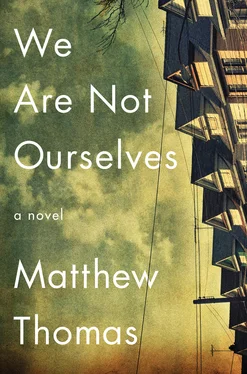When they moved, he was going to leave part of himself behind. Even the ex-friends who gave him so much trouble were part of his life. Maybe they’d all look back on it and laugh when they were adults, drinking wine around each other’s kitchen tables, throwing their heads back and remembering how they were as kids. You had to stay in the same town to get that kind of rich history with people. You had to have ties that ran pretty deep.
He wasn’t going to have a home anymore, not in the same way. His mother didn’t seem to mind that idea. But his mother had stayed in Woodside until she was in her twenties. Her best friends were people she’d known since first grade. He saw the way they enjoyed each other’s company. She said it wasn’t like that anymore, that people moved around, that there weren’t neighborhoods anymore like there used to be, but he knew it could be like that. All you had to do was not go anywhere.
• • •
He was playing Mike Tyson’s Punch Out!! at Farshid’s. He tried twice to get past Piston Honda, but his heart wasn’t in it. He handed the controls to Farshid and watched him work his way through Soda Popinski and Bald Bull. Connell couldn’t even get to the place Farshid started from. Farshid’s fingers on the buttons looked like the beating of a hummingbird’s wings.
Kids pretty much left Farshid alone. He’d come to St. Joan’s in sixth grade, by which point everybody had settled into cliques. He was kind of a free agent.
“My mother’s going to move us,” Connell said.
“Yeah?” Farshid sounded like he’d heard him but not heard him. He was moving the controller around in the air as he slapped furiously at the buttons.
“She wants to get us out of here.”
“Where to?”
“Westchester.”
“Where’s that?”
“The suburbs.”
“That’s cool.” He cursed and threw the controller, though it landed softly on the rug, and he retracted it by the cord and restarted the game.
“I don’t want to go.”
“Why not?”
“I have my friends here,” he said.
“You’d get a backyard. Maybe a pool.”
“Yeah.”
“I’d do it.”
“What about your friends?”
“What about ’em?”
“You wouldn’t care about leaving?”
“No offense,” he said, “but yeah — no.”
“I’d miss you and Hector. Even Elbert.”
“You’re not gonna see us anyway, even if you stay. You’re gonna be in the big city with all your nerd friends. You’re gonna jerk each other off in the locker room.”
“Maybe you have me confused with yourself,” Connell said.
“I’m going to have girls do that for me, thank you very much.”
“Everything’s going to change all at once.”
Farshid finished the level and paused the game. “You just need to reinvent yourself. That’s what my mother said to me, ‘Reinvent yourself.’ In Farsi, though: ‘ Khodeto az no dorostkon .’ I didn’t want to come here, man. There was some political shit with my father. We had to leave fast. Talk about everything changing.”
“You couldn’t go to Brooklyn Tech if you moved.”
“I don’t give a shit where I go to high school, man! Here, there, I don’t care. I care about what’s after that. College! Living on my own.” He slapped his hands together. “Beautiful girls in my dorm room! Hah!”
Connell knew why the other kids didn’t tease Farshid. He wasn’t vulnerable to them; he already had a plan.
“This is home,” Connell said.
“Home?” Farshid said. “What does that even mean? I’m going to work on Wall Street. I’m going to have a hot wife like Alyssa Milano that I bang a lot in my big bed. I’m going to have a big house and a big pool. That’s home.”
Connell felt like a child; all he cared about was getting to hold a girl’s hand someday, and Farshid was already thinking of what he would do with his wife.
“Sounds good,” Connell said.
“Reinvent yourself!” Farshid said, handing him the joystick. “You can start by not sucking so bad at Punch Out!! ”
“I have to invent myself before I can reinvent myself,” Connell said.
“Aw, don’t say that,” Farshid said. “You’re already somebody. You’re the biggest nerd I ever met in my entire life.”
It started in math class. Gustavo Cruz was tapping him on the back. Connell had been resisting all year, but Gustavo hadn’t given up. It was the time of year when every point counted for some kids. Usually Connell just framed his test more tightly with his arms, leaned over it more to obscure it with his body. He didn’t care if it made him look like a hopeless nerd; he wanted the teachers to know he had nothing to do with cheating.
Gustavo was slapping him on the neck now. Connell couldn’t turn around to tell him to stop without risking looking like a conspirator.
He thought about what he must look like to the others — a stiff kid incapable of acting normal, a former fat kid still awkward in his body, a nerd with no style or balls who would never, ever kiss a girl. He’d been insulted and made fun of a thousand times, and he’d hung from the basketball hoop, desperate to shift his hand down to cover his privates but too afraid to fall, but he hadn’t suffered the truest humiliation, because his parents always told him he was worth more than other kids could see. He wasn’t sure he believed that anymore.
He sat up straighter, leaned to the side, and gave Gustavo full view of his paper — the top part, at least. It was a multiple-choice test with a couple of show-your-work problems at the bottom. The multiple-choice alone was enough to get Gustavo to pass. Connell was nervous. He would have been even more nervous if Miss Montero ever even looked his way during tests, but he’d put up such staunch resistance that it must have seemed to her as if the fight on that front had been permanently won.
In the lunchroom Gustavo exulted.
“Man, that was the shit . Cuh- nell! ”
“Shh…” Connell tried to play it cool, but he felt exposed. “Keep it quiet.”
“I get you, man.”
A couple of days later, when they had a surprise quiz, Connell waited until he’d finished and then leaned to the side a little. This time Miss Montero snapped, “Eyes on your own paper!” but Gustavo had probably had enough time.
“Cuh- nell !” Gustavo said again, and Connell thought, Con- null. Con- null.
• • •
That afternoon, instead of hustling home, he found himself sitting on the rectory steps with them. Some cosmic sleight of hand had deposited him in their midst. He hoped none of them would notice he didn’t belong.
They went to Shane’s apartment to make prank calls. They called Gianni’s and had a pie delivered to the address in the phone book for one of their teachers. They called Antigone Psillos, a good-hearted, untouchably homely girl who had been given the unimaginative nickname of An- pig -o-nee. Pete asked her out, and when she cautiously agreed, he said, “Psych!” and hung up the phone.
“What’s that Chinese kid you hang out with?”
“Who?”
“Your friend,” Shane said. “Elbert. Elbert Lim.”
“He’s not my friend.”
“Whatever. What’s his number?”
“I don’t know,” Connell said.
“Here,” Shane said, passing him the phone. “You dial it. Order some Chinese food.”
The guys were sniggling and slapping their knees. They were in Shane’s living room. His mother worked late, and his father wasn’t even in the country. He was a Marine who’d been in the Gulf War. He was supposed to have come back in March, when the war ended, but he’d been sent to Bangladesh to do relief work after a cyclone. There was a picture of him in his uniform on the wall right above the phone.
Читать дальше
Конец ознакомительного отрывка
Купить книгу












